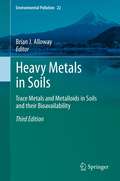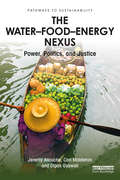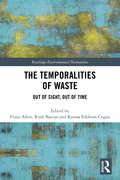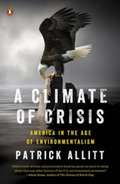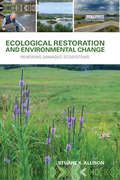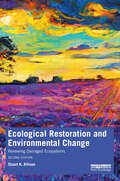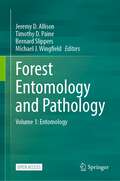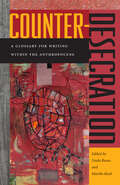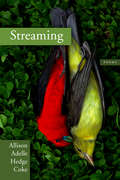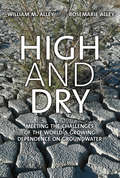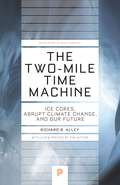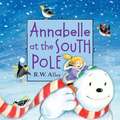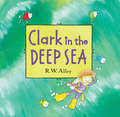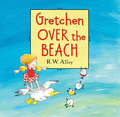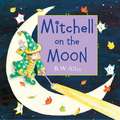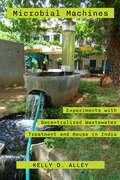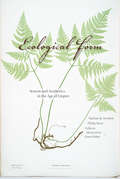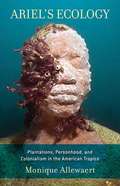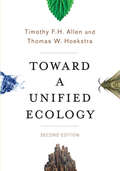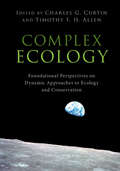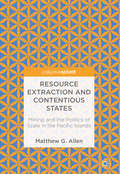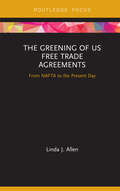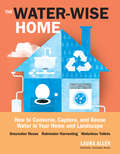- Table View
- List View
Heavy Metals in Soils: Trace Metals and Metalloids in Soils and their Bioavailability
by Brian J. AllowayThis third edition of the book has been completely re-written, providing a wider scope and enhanced coverage. It covers the general principles of the natural occurrence, pollution sources, chemical analysis, soil chemical behaviour and soil-plant-animal relationships of heavy metals and metalloids, followed by a detailed coverage of 21 individual elements, including: antimony, arsenic, barium, cadmium, chromium, cobalt, copper, gold, lead, manganese, mercury, molybdenum, nickel, selenium, silver, thallium, tin, tungsten, uranium, vanadium and zinc. The book is highly relevant for those involved in environmental science, soil science, geochemistry, agronomy, environmental health, and environmental engineering, including specialists responsible for the management and clean-up of contaminated land.
The Water–Food–Energy Nexus: Power, Politics, and Justice (Pathways to Sustainability)
by Jeremy Allouche Carl Middleton Dipak GyawaliThe world of development thinkers and practitioners is abuzz with a new lexicon: the idea of "the nexus" between water, food, and energy which is intuitively compelling. It promises better integration of multiple sectoral elements, a better transition to greener economies, and sustainable development. However, there appears to be little agreement on its precise meaning, whether it only complements existing environmental governance approaches or how it can be enhanced in national contexts. One current approach to the nexus treats it as a risk and security matter while another treats it within economic rationality addressing externalities across sector. A third perspective acknowledges it as a fundamentally political process requiring negotiation amongst different actors with distinct perceptions, interests, and practices. This perspective highlights the fact that technical solutions for improving coherence within the nexus may have unintended and negative impacts in other policy areas, such as poverty alleviation and education. The Water–Food–Energy Nexus: Power, Politics and Justice lays out the managerial-technical definitions of the nexus and challenges these conceptions by bringing to the forefront the politics of the nexus, around two key dimensions – a dynamic understanding of water–food–energy systems, and a normative positioning around nexus debates, in particular around social justice. The authors argue that a shift in nexus governance is required towards approaches where limits to control are acknowledged, and more reflexive/plural strategies adopted. This book will be of interest to academic researchers, policy makers, and practitioners in the fields of international development studies, environmental politics, and science and technology studies, as well as international relations.
The Temporalities of Waste: Out of Sight, Out of Time (Routledge Environmental Humanities)
by Fiona Allon Ruth Barcan Karma Eddison-CoganThis book investigates the complex and unpredictable temporalities of waste. Reflecting on waste in the context of sustainability, materiality, social practices, subjectivity and environmental challenges, the book covers a wide range of settings, from the municipal garbage crisis in Beirut, to food rescue campaigns in Hong Kong and the toxic by-products of computer chip production in Silicon Valley. Waste is one of the most pressing issues of the day, central to environmental challenges and the development of healthier and more sustainable futures. The emergence of the new field of discard studies, in addition to expanding research across other disciplines within the social sciences, is testament to the centrality of waste as a crucial social, material and cultural problem and to the need for multi- and transdisciplinary approaches like those provided in this volume. This edited collection seeks to develop a framework that understands the material properties of different kinds of waste, not as fixed, stable or singular but asdynamic, relational and often invisible. It brings together new and cutting-edge research on the temporalities of waste by a diverse range of international authors. Collectively, this research presents a persuasive argument about the need to give more credence to the capacities of waste to provoke us in materially and temporally complex ways, especially those substances that complicate our understandings of life as bounded duration. This book will be of great interest to students and scholars of the environmental humanities, cultural studies, anthropology and human geography.
A Climate of Crisis: America in the Age of Environmentalism
by Patrick AllittA provocative history of the environmental movement in America, showing how this rise to political and social prominence produced a culture of alarmism that has often distorted the factsFew issues today excite more passion or alarm than the specter of climate change. In A Climate of Crisis, historian Patrick Allitt shows that our present climate of crisis is far from exceptional. Indeed, the environmental debates of the last half century are defined by exaggeration and fearmongering from all sides, often at the expense of the facts. In a real sense, Allitt shows us, collective anxiety about widespread environmental danger began with the atomic bomb. As postwar suburbanization transformed the American landscape, more research and better tools for measurement began to reveal the consequences of economic success. A climate of anxiety became a climate of alarm, often at odds with reality. The sixties generation transformed environmentalism from a set of special interests into a mass movement. By the first Earth Day in 1970, journalists and politicians alike were urging major initiatives to remedy environmental harm. In fact, the work of the new Environmental Protection Agency and a series of clean air and water acts from a responsive Congress inaugurated a largely successful cleanup. Political polarization around environmental questions after 1980 had consequences that we still feel today. Since then, the general polarization of American politics has mirrored that of environmental politics, as pro-environmentalists and their critics attribute to one another the worst possible motives. Environmentalists see their critics as greedy special interest groups that show no conscience as they plunder the earth while skeptics see their adversaries as enemies of economic growth whose plans stifle initiative under an avalanche of bureaucratic regulation. There may be a germ of truth in both views, but more than a germ of falsehood too. America’s worst environmental problems have proven to be manageable; the regulations and cleanups of the last sixty years have often worked, and science and technology have continued to improve industrial efficiency. Our present situation is serious, argues Allitt, but it is far from hopeless. Sweeping and provocative, A Climate of Crisis challenges our basic assumptions about the environment, no matter where we fall along the spectrum—reminding us that the answers to our most pressing questions are sometimes found in understanding the past.From the Trade Paperback edition.
A Climate of Crisis
by Patrick AllittA provocative history of the environmental movement in America, showing how this rise to political and social prominence produced a culture of alarmism that has often distorted the facts Few issues today excite more passion or alarm than the specter of climate change. In A Climate of Crisis, historian Patrick Allitt shows that our present climate of crisis is far from exceptional. Indeed, the environmental debates of the last half century are defined by exaggeration and fearmongering from all sides, often at the expense of the facts. In a real sense, Allitt shows us, collective anxiety about widespread environmental danger began with the atomic bomb. As postwar suburbanization transformed the American landscape, more research and better tools for measurement began to reveal the consequences of economic success. A climate of anxiety became a climate of alarm, often at odds with reality. the sixties generation transformed environmentalism from a set of special interests into a mass movement. by the first Earth Day in 1970, journalists and politicians alike were urging major initiatives to remedy environmental harm. In fact, the work of the new Environmental Protection Agency and a series of clean air and water acts from a responsive Congress inaugurated a largely successful cleanup. Political polarization around environmental questions after 1980 had consequences that we still feel today. Since then, the general polarization of American politics has mirrored that of environmental politics, as pro-environmentalists and their critics attribute to one another the worst possible motives. Environmentalists see their critics as greedy special interest groups that show no conscience as they plunder the earth while skeptics see their adversaries as enemies of economic growth whose plans stifle initiative under an avalanche of bureaucratic regulation. There may be a germ of truth in both views, but more than a germ of falsehood too. America's worst environmental problems have proven to be manageable; the regulations and cleanups of the last sixty years have often worked, and science and technology have continued to improve industrial efficiency. Our present situation is serious, argues Allitt, but it is far from hopeless. Sweeping and provocative, A Climate of Crisis challenges our basic assumptions about the environment, no matter where we fall along the spectrum--reminding us that the answers to our most pressing questions are sometimes found in understanding the past.
Ecological Restoration and Environmental Change: Renewing Damaged Ecosystems
by Stuart K. AllisonWhat is a natural habitat? Who can define what is natural when species and ecosystems constantly change over time, with or without human intervention? When a polluted river or degraded landscape is restored from its damaged state, what is the appropriate outcome? With climate change now threatening greater disruption to the stability of ecosystems, how should restoration ecologists respond? Ecological Restoration and Environmental Change addresses and challenges some of these issues which question the core values of the science and practice of restoration ecology. It analyzes the paradox arising from the desire to produce ecological restorations that fit within an historical ecological context, produce positive environmental benefits and also result in landscapes with social meaning. Traditionally restorationists often felt that by producing restorations that matched historic ecosystems they were following nature's plans and human agency played only a small part in restoration. But the author shows that in reality the process of restoration has always been defined by human choices. He examines the development of restoration practice, especially in North America, Europe and Australia, in order to describe different models of restoration with respect to balancing ecological benefit and cultural value. He develops ways to balance more actively these differing areas of concern while planning restorations. The book debates in detail how coming global climate change and the development of novel ecosystems will force us to ask new questions about what we mean by good ecological restoration. When the environment is constantly shifting, restoration to maintain biodiversity, local species, and ecosystem functions becomes even more challenging. It is likely that in the future ecological restoration will become a never-ending, continuously evolving process.
Ecological Restoration and Environmental Change: Renewing Damaged Ecosystems
by Stuart K. AllisonEcological Restoration and Environmental Change presents an introduction to the practice of renewing and restoring degraded, damaged, or destroyed ecosystems and habitats in the environment. The book addresses and challenges key issues which question the core values of the science and practice of restoration ecology. The author explains that the process of restoration has always been defined by human choices and examines the development of restoration practice, to describe different models of restoration with respect to balancing ecological benefit and cultural value. He develops ways to balance more actively these differing areas of concern while planning restorations. This new edition has been fully revised and updated to reflect changes in the field and the new challenges posed to restoration ecology in the face of the rapid pace of climate change. With strong coverage of North and South American, Europe, and Australia, this new edition has been expanded to also address indigenous perspectives and restoration projects in Africa, the Pacific Islands, and Asia. It places special emphasis on the need for restorationists to appreciate and understand the intricacies of planning and managing restorations in novel ecosystems. Lastly, it provides a critique of the new restoration standards published by the Society for Ecological Restoration in 2019. This book is essential reading for students on restoration ecology and conservation courses, as well as professionals and practitioners working on restoration projects.
Forest Entomology and Pathology: Volume 1: Entomology
by Jeremy D. Allison Timothy D. Paine Bernard Slippers Michael J. WingfieldThis open access book will provide an introduction to forest entomology, the principles and techniques of forest insect pest management, the different forest insect guilds/feeding groups, and relevant forest insect pest management case studies. In addition to covering 30% of the earth, forest ecosystems provide numerous timber and non-timber products that affect our daily lives and recreational opportunities, habitat for diverse animal communities, watershed protection, play critical roles in the water cycle, and mitigate soil erosion and global warming. In addition to being the most abundant organisms in forest ecosystems, insects perform numerous functions in forests, many of which are beneficial and critical to forest health. Conversely, some insects damage and/or kill trees and reduce the capacity of forests to provide desired ecosystem services. The target audience of this book is upper-level undergraduate and graduate students and professionals interested in forest health and entomology.
Counter-Desecration: A Glossary for Writing Within the Anthropocene
by Allison Adelle Hedge Coke Linda Russo Marthe ReedThe Anthropocene is a term proposed for the present geological epoch (from the time of the Industrial Revolution onwards) to highlight the role of humanity in the transformation of earth’s environment globally, has become the subject of scholarship not only in the sciences, but also in the arts and humanities as well. Ecopoetics, a multidisciplinary approach that includes thinking and writing on poetics, science, and theory as well as emphasizing innovative approaches common to conceptual poetry, rose out of the late 20th-century awareness of ecology and concerns of environmental disaster.Collected from contributors including Brenda Hillman, Eileen Tabios, and Christopher Cokinos, and together a monument to human responsiveness and invention, Counter-Desecration is a book of ecopoetics that compiles terms—borrowed, invented, recast—that help configure or elaborate human engagement with place. There are no analogous volumes in the field of ecocriticism and ecopoetics. The individual entries, each a sketch or a notion, through some ecopoetic lens—anti-colonialism, bioregionalism, ecological (im)balance, indigeneity, resource extraction, extinction, habitat loss, environmental justice, queerness, attentiveness, sustainability—focus and configure the emerging relations and effects of the Anthropocene. Each entry is a work of art concerned with contemporary poetics and environmental justice backed with sound observation and scholarship.
Streaming
by Allison Adelle Hedge CokeFrom "Carcass": Split skin stretched over marrowless cage,encased dry tomb, like those strewn through this loess reach, cradling past ever present here, and now you come walking riverside, bringing sensory thrill into daylight much like this cervidae culled morning each waking before demise. We move this way, catching life until death captures us, where we rot into the same dust holding multitudes before us, and welcoming those beyond. Allison Adelle Hedge Coke is a poet, writer, performer, editor, and activist.
High and Dry: Meeting the Challenges of the World's Growing Dependence on Groundwater
by Rosemarie Alley William M. AlleyAn engaging call to understand and protect groundwater, the primary source of drinking water for almost half of the world's population Groundwater is essential for drinking water and food security. It provides enormous environmental benefits by keeping streams and rivers flowing. But a growing global population, widespread use of industrial chemicals, and climate change threaten this vital resource. Groundwater depletion and contamination has spread from isolated areas to many countries throughout the world. In this accessible and timely book, hydrology expert William M. Alley and science writer Rosemarie Alley sound the call to protect groundwater. Drawing on examples from around the world, including case studies in the United States, Canada, Australia, India, and Sub-Saharan Africa, the authors examine groundwater from key scientific and socioeconomic perspectives. While addressing the serious nature of groundwater problems, the book includes stories of people who are making a difference in protecting this critical resource.
The Two-Mile Time Machine: Ice Cores, Abrupt Climate Change, and Our Future - Updated Edition (Princeton Science Library #31)
by Richard B. AlleyIn the 1990s Richard B. Alley and his colleagues made headlines with the discovery that the last ice age came to an abrupt end over a period of only three years. In The Two-Mile Time Machine, Alley tells the fascinating history of global climate changes as revealed by reading the annual rings of ice from cores drilled in Greenland. He explains that humans have experienced an unusually temperate climate compared to the wild fluctuations that characterized most of prehistory. He warns that our comfortable environment could come to an end in a matter of years and tells us what we need to know in order to understand and perhaps overcome climate changes in the future.In a new preface, the author weighs in on whether our understanding of global climate change has altered in the years since the book was first published, what the latest research tells us, and what he is working on next.
Annabelle at the South Pole
by R. W. AlleyAnnabelle is trapped inside on a cold, wintry afternoon with her brothers and sister. When they won’t stop pestering her, she sets off into the snowy backyard in search of adventure, and soon finds herself at the South Pole in the company of an abominable (but adorable) snowman. This magical winter story joins Clark in the Deep Sea, Gretchen Over the Beach, and Mitchell on the Moon in a four-book series that celebrates the power of imagination, created by the veteran children’s book illustrator R. W. Alley.
Clark in the Deep Sea
by R. W. AlleyClark and his brother and sisters are stuck on their front porch on a rainy spring day. When a stuffed bear is flung off the porch into a puddle, the backyard becomes an ocean, and Clark, with some help from his siblings, embarks on a deep-sea diving rescue mission. Full of classic charm, this satisfying fantasy is one of four small books each starring a different sibling and season by the children's book veteran R. W. Alley. Look for Mitchell on the Moon and Annabelle at the South Pole in Fall 2016.
Gretchen Over the Beach
by R. W. AlleyOn a breezy summer day, Gretchen and her family head to the ocean. Gretchen wants to swim with her older brothers and sister, but everyone ignores her. When the wind steals her new sun hat, she catches it by its ribbon and is lifted into the sky, far, far above the beach, where a friendly seagull is happy to play. This ode to imagination is one of four small books each featuring a different sibling and season, created by children's book veteran R. W. Alley. Look for Mitchell on the Moon and Annabelle at the South Pole in Fall 2016.
Mitchell on the Moon
by R. W. AlleyIt’s Halloween, and Mitchell’s littlest sister, Gretchen, looks up at the moon and sees that part of it is missing. Gretchen's other siblings, Annabelle and Clark, scornfully tell her that the moon is just hiding behind some clouds, but Mitchell indulges her and sets out to save the moon. A humorous and slightly scary fantasy ensues before the four children set off for trick-or-treating. This spooky fall story joins Clark in the Deep Sea, Gretchen Over the Beach, and Annabelle at the South Pole in a four-book series that celebrates the power of imagination, created by the veteran children’s book illustrator R. W. Alley.
Microbial Machines: Experiments with Decentralized Wastewater Treatment and Reuse in India
by Kelly D. AlleyAround 2004, members of governmental and nongovernmental organizations, science institutes, and private companies throughout India began brainstorming and then experimenting with small-scale treatment systems that could produce usable water from wastewater. Through detailed case studies, Microbial Machines describes how residents, workers, and scientists interact with technology, science, and engineering during the processes of treatment and reuse. Using a human-machine-microbe framework, Kelly Alley explores the ways that people's sensory perceptions of water—including disgust—are dynamic and how people use machines and microbes to digest wastewater. A better understanding of how the human and nonhuman interact in these processes will enable people to generate more effective methods for treating and reusing wastewater. While decentralized wastewater treatment systems may not be a perfect solution, they alleviate resource stress in regions that are particularly hard hit by climate change. These case studies have broad relevance for solving similar problems in many other places around the world.
Ecological Form: System and Aesthetics in the Age of Empire
by Monique Allewaert Sukanya Banerjee Adam Grener Deanna K. Kreisel Elizabeth Carolyn Miller Benjamin Morgan Aaron Rosenberg Teresa Shewry Jesse Oak Taylor Lynn Voskuil Karen Pinkus Philip Steer Nathan K. HensleyEcological Form brings together leading voices in nineteenth-century ecocriticism to suture the lingering divide between postcolonial and ecocritical approaches. Together, these essays show how Victorian thinkers used aesthetic form to engage problems of system, interconnection, and dispossession that remain our own. The authors reconsider Victorian literary structures in light of environmental catastrophe; coordinate “natural” questions with sociopolitical ones; and underscore the category of form as a means for generating environmental—and therefore political—knowledge. Moving from the elegy and the industrial novel to the utopian romance, the scientific treatise, and beyond, Ecological Form demonstrates how nineteenth-century thinkers conceptualized the circuits of extraction and violence linking Britain to its global network. Yet the book’s most pressing argument is that this past thought can be a resource for reimagining the present.
Ariel's Ecology: Plantations, Personhood, and Colonialism in the American Tropics
by Monique AllewaertWhat happens if we abandon the assumption that a person is a discrete, world-making agent who acts on and creates place? This, Monique Allewaert contends, is precisely what occurred on eighteenth-century American plantations, where labor practices and ecological particularities threatened the literal and conceptual boundaries that separated persons from the natural world. Integrating political philosophy and ecocriticism with literary analysis, Ariel's Ecology explores the forms of personhood that developed out of New World plantations, from Georgia and Florida through Jamaica to Haiti and extending into colonial metropoles such as Philadelphia. Allewaert's examination of the writings of naturalists, novelists, and poets; the oral stories of Africans in the diaspora; and Afro-American fetish artifacts shows that persons in American plantation spaces were pulled into a web of environmental stresses, ranging from humidity to the demand for sugar. This in turn gave rise to modes of personhood explicitly attuned to human beings' interrelation with nonhuman forces in a process we might call ecological. Certainly the possibility that colonial life revokes human agency haunts works from Shakespeare's Tempest and Montesquieu's Spirit of the Laws to Spivak's theories of subalternity. In Allewaert's interpretation, the transformation of colonial subjectivity into ecological personhood is not a nightmare; it is, rather, a mode of existence until now only glimmering in Che Guevara's dictum that postcolonial resistance is synonymous with "perfect knowledge of the ground. "
Toward a Unified Ecology (Complexity in Ecological Systems)
by Timothy Allen Thomas HoekstraThe first edition of Toward a Unified Ecology was ahead of its time. For the second edition, the authors present a new synthesis of their core ideas on evaluating communities, organisms, populations, biomes, models, and management. The book now places greater emphasis on post-normal critiques, cognizant of ever-present observer values in the system. The problem it addresses is how to work holistically on complex things that cannot be defined, and this book continues to build an approach to the problem of scaling in ecosystems. Provoked by complexity theory, the authors add a whole new chapter on the central role of narrative in science and how models improve them. The book takes data and modeling seriously, with a sophisticated philosophy of science.
Complex Ecology: Foundational Perspectives Of A Dynamic View Of Ecology And Conservation
by Timothy F. Allen Charles G. CurtinFrom climate change to species extinction, humanity is confronted with an increasing array of societal and environmental challenges that defy simple quantifiable solutions. Complexity-based ecology provides a new paradigm for ecologists and conservationists keen to embrace the uncertainty that is pressed upon us. This book presents key research papers chosen by some sixty scholars from various continents, across a diverse span of sub-disciplines. The papers are set alongside first person commentary from many of the seminal voices involved, offering unprecedented access to experts' viewpoints. The works assembled also shed light on the process of science in general, showing how the shifting of wider perspectives allows for new ideas to take hold. Ideal for undergraduate and advanced students of ecology and conservation, their educators and those working across allied fields, this is the first book of its kind to focus on complexity-based approaches and provides a benchmark for future collected volumes.
Resource Extraction and Contentious States: Mining And The Politics Of Scale In The Pacific Islands
by Matthew G. AllenThis Pivot offers a comprehensive cross-country study of the effects of large-scale resource extraction in Asia Pacific, considering how large-scale extractive industries engender contentious social, political and economic questions. Addressing the strong association in Melanesia between extractive resource industries and a spectrum of violence ranging from interpersonal to collective forms, it questions whether islands are particularly potent spaces for the contentious politics that attend enclave economies. The book brings island studies literature into a closer conversation with political and economic geography, demonstrating that islands provide rich spaces for the investigation of the socio-spatial relations at the heart of human geography’s theoretical cannon. The book also has a real-world policy edge, as the sustained and growing dominance of extractive industries, in concert with the highly contentious politics that they engender, places them at the centre of efforts to understand state formation, political reordering and the on-going negotiation of political settlements of various types throughout post-colonial Melanesia. It considers how extractive resource industries can shape processes of state formation, shedding new light on Melanesia’s resource curse.
Scandal's Virgin: Bride By Mail Scandal's Virgin No Place For An Angel
by Louise AllenA lady with a secret sorrow Reeling from heartbreak, Lady Laura Campion transformed herself into the infamous Scandal's Virgin of high society-flirtatious, alluring and utterly shocking-yet always stopping short of absolute ruin. But now she has new hope-the daughter she thought lost is alive, and under the guardianship of the powerful Avery Falconer, Earl of Wykeham. Going into battle against Lord Wykeham may be her only option to win little Alice back, but she doesn't expect the irresistible attraction that simmers between her and the formidable Earl. Laura finally has a chance at happiness, but can she persuade Avery to forgive her past? "Allen reaches into readers' hearts." -RT Book Reviews on Married to a Stranger
The Greening of US Free Trade Agreements: From NAFTA to the Present Day (Routledge Focus on Environment and Sustainability)
by Linda AllenThis book provides an up-to-date critical analysis of the integration of environmental policies into US free trade agreements. The work focuses on the evolution of the design of environmental policies and analyzes their effectiveness. Starting with the North American Free Trade Agreement (NAFTA) leading to the Trans-Pacific Partnership (TPP), the book examines the history of policy integration. In doing so, it provides an overview of the major trade-related environmental policies and presents empirical research on their effectiveness, a discussion of the continued demand for policy integration in light of the effectiveness, and recommendations for addressing shortcomings. The main objective of the book is to inform the ongoing policy debate over integration of environmental policies into trade agreements. The current renegotiation of NAFTA provides an opportune time for undertaking this critical review of trade-related environmental policies. As our understanding and knowledge of the environmental policies associated with US trade agreements, in particular for NAFTA, has grown significantly over the past twenty-five years, this book provides a timely and critical update for this policy debate. Students and scholars of environmental law, trade and economics, and specifically US trade, environmental policy and law will find this book of great interest.
The Water-Wise Home: How to Conserve, Capture, and Reuse Water in Your Home and Landscape
by Laura AllenSave the earth’s most precious resource while also saving yourself money. Laura Allen provides expert strategies for using water smartly and efficiently while fulfilling all of your home and garden needs. Learn how to create a water-wise landscape, reuse greywater, harvest rainwater, and even set up a waterless composting toilet. Offering proven techniques in clear and accessible language, The Water-Wise Home makes it easy to help the environment and lower your household operating costs through conserving water.
